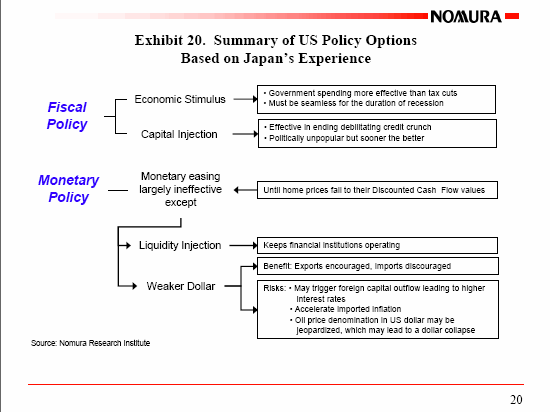Koo's theories depend on something like a "closed system."abs wrote: > I imagine that Koo might argue, as does Roubini, that the
> government needs to become the lender and consumer of last resort.
> In a sense, they are both saying the same thing although in
> different ways. So, put another way, if the US government begins
> to consume exports from Japan (instead of the US public consuming
> them), isn't the net change to Japan's exports zero? Now obviously
> I realize that this is not a perfect solution because the US
> government is not going to start buying all kinds of consumer
> electronics exported by Japan, but perhaps the US could start
> buying some very high tech military equipment manufactured in
> Japan resulting in a net change of zero in total exports from
> Japan to the US. Now imagine this happening on a global scale . .
That is, suppose I'm the government, and I pay you $1,000 "stimulus" to build a
bridge. You build the bridge, but you don't spend any of the money.
Instead, you save it in a bank account or you use it to pay off your
credit cards. Either way, the money ends up in the bank, and the
bank uses it to buy T-bills, so I get the $1,000 back.
That only works if there's no "leakage" -- that is, you don't spend
any of the money. If you buy any consumable products, like food and
clothes, then I won't get back the entire $1,000.
Of course, there has to be some leakage -- people have to eat. But
in the case of Japan, the leakage could be balanced by receiving
foreign exchange from exports.
In our case today, we know that Obama is planning a massive
"stimulus" package. This early in the deflationary spiral, a lot of
that money will be simply consumed, and will not return to the
government. The health care proposal alone will be a huge hole.
Obama's response will be to spend more and more, money that will be
consumed, and will not return to the treasury in the form of
macroeconomic savings.
It's a good thing to remind ourselves that Barack Obama has
absolutely no idea what's going on. He knew as little as Sara Palin
when he started campaigning, but he started memorizing position
papers and sound bytes, and now he can give policy speeches like the
best of the politicians.
But he doesn't have any feel whatsoever for macroeconomic discipline.
He comes from a Chicago society that viewed America as the greatest
evil in the history of the world (Reverend Wright) and that viewed
that America's only major economic problem was that the government
didn't spend enough money on poor people ("community organizing").
He has absolutely no experience with or understanding of the concept
that governments have to say "No" to people. (At least Sara Palin
had to do that as governor.)
So Obama is going to pour money into things that don't follow Koo's
formula. He'll be listening to labor unions and other special
interest groups, and he'll pour money into consumption. Furthermore,
since he has no personal experience with governmental fiscal
discipline, he'll pour out more and more money until it reaches a
crisis point.
The above description may seem like a criticism of Obama (and it is),
but as far as I know, Obama would not disagree with it. He and his
advisers have said and done absolutely nothing that I know of to
reduce expectations. All I ever hear from Obama and his advisers is
that high unemployment "is unacceptable," and that "as much money as
necessary will be spent" to reverse the situation.
So yes, what you say is theoretically possible, just as it's
theoretically possible that Obama's stimulus program will work just
fine. But as a practical matter, that's not going to happen. There
will be a completely undisciplined flood of money pouring out into
the wrong projects, until some tipping point is reached.
Generational theory does not depend on life expectancy, which isabs wrote: > It seems to me that if life expectancies were shorter at that
> time, that the 4 generational cycle might have been completed
> within 50 years versus the 70-80 years we have now.
usually pulled down by child mortality, which is irrelevant to
generational cycles. It depends on the maximum effective human
lifespan, which has always been around 80 years.
Sincerely,
John
